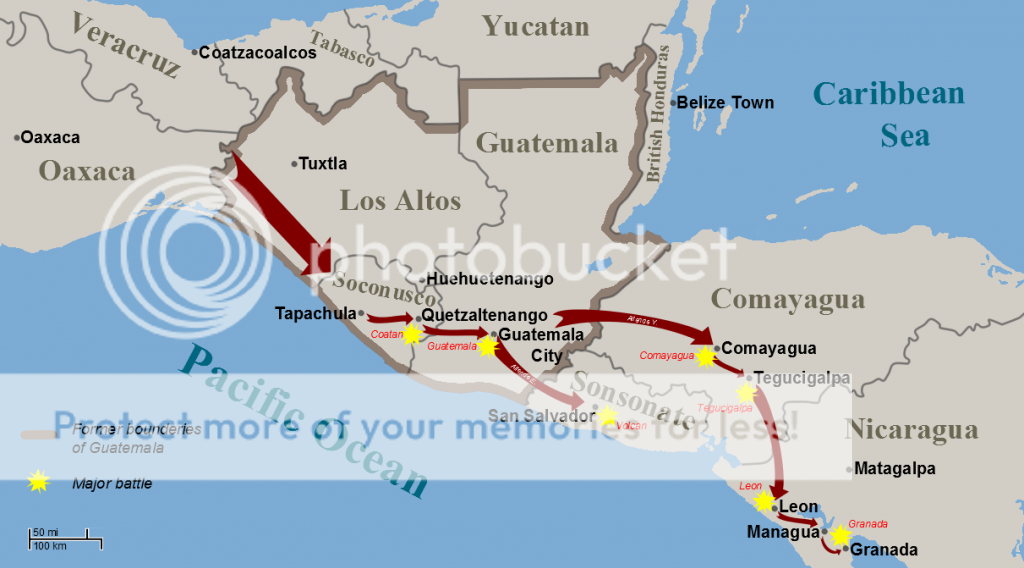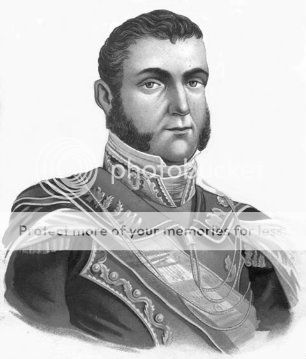First off I want to apologize for the delay (yet again), these last few weeks have kept me from properly devoting the time to make this update, but I'm happy to say I finally have one. A little different from what I usually post, and I've never been the best at narrative, but I hope you guys enjoy it.
 Sunday March 26, 1837
Sunday March 26, 1837
San Miguel el Grande, Guanajuato
United Mexican States
The sun blazed mightily in the skies over the rolling green hills of the Bajío, as the ringing of church bells resonated through the countryside, signaling the end of another Easter Mass. As church goers filed out of San Miguel’s mighty cathedral, filling the village with boisterous life once again, a wooden stagecoach raced its way past the sanmiguelenses and into the surrounding countryside. The stagecoach seemed rather ornate, matching only a very few in the region. Sensibly enough it happened to belong to Mexico’s President-elect, and one of the wealthiest men in the entire country.
“Hilario, conduct a left turn at the approaching road,” said a deep male voice from inside the coach.
“
Sí, por supuesto don Agustín,” said the cabby, who proceeded to make a left turn onto a dirt road, as per his master’s instructions.
The coach followed the dirt road for some time, upon which it arrived near a great hacienda. The coach came to a halt, and its occupant exited, just as three men on horseback grew larger on the horizon.
The nearest man dismounted his horse and began to walk towards the stagecoach. He was tall and evidently robust, much like the man who had just appeared from the coach. Despite wearing a sombrero, there were patches of white visible in the man’s brown hair.
“
Don Agustín…what do I owe this surprise visit?
Iturbide gave a curt bow. “
Don Ignacio, if you would be kind enough to give me some of your time, I would like to have a small word with you.”
“Perhaps you should bow further and show some more respect to the father of our country!” exclaimed one of the other men still on horseback. He was a spitting image of Allende, albeit younger in form.
“Enough Indalecio! We must show respect to our guests, regardless of who they are,” said Ignacio, making a point to direct his scowl at Iturbide. “
Por favor don Agustín,” motioning in the direction of the hacienda. At that, the two older gentlemen tread away.
“What on earth does Iturbide want with your father?” uttered the blond man also mounted on horseback. He, like Indalecio, was well built, sporting a goatee and a long scar which ran diagonally across his face.
“
Dios sabe, Carlos…dios sabe. It cannot be good…that much, I do know.”
***
Both Allende and Iturbide entered the former’s hacienda, walking through a dim passage and entering an outdoor courtyard. Setting down at a nearby table, Allende motioned his hand to the empty chair next to him, beckoning Iturbide to sit down.
“Hernanda, please bring us some pulque.” The squatty woman whom had been standing nearby promptly walked off.
Allende folded his hands and set them on the table in front of him. “Forgive me, but I must admit I am somewhat shocked to find you of all people in San Miguel,
don Agustín…and of all days, on Easter,” said Allende.
“Yes, well…extraordinary times call for extraordinary measures, I’m sure you would agree with me General Allende.
Allende furled an eyebrow in confusion.
“I shall be quite frank with you General Allende, I come here to ask for your help.” More confusion drew upon Allende’s face.
“As you are well aware, my triumph in the previous election has elicited a…violent reaction in many quarters of the nation.”
“Yes, I’m well aware of these crises…I was in Guadalajara several weeks ago and the situation in Zacatecas was still far from being resolved. They don’t seem to like you
don Agustín.”
“Well yes, I’m well aware of how certain factions and individuals are disposed towards me. Nevertheless, I’m confident the events in
el norte and Yucatán will resolve themselves in favor of the national interest. My fears lie farther to the south, in Guatemala.”
“Yes, I’ve been hearing of some of the atrocities being committed in that region,” muttered Allende.
“It’s Carrera and his horde of savages!” uttered Iturbide, swashing his clenched hand with such force that it alarmed Hernanda as she placed a bottle of white pulque and two clay mugs on the table.
“
Eso es todo, gracias Hernanda.” Allende nodded towards his servant, and she responded in kind, promptly pacing out of the courtyard.
“As I was saying, our control over the far south is deteriorating quickly than I would like to admit. That said, I come to you, and invite you to head an army that will reign in the isthmian provinces.”
Allende face pursed up after Iturbide’s words, though it had more to do with the pulque the former had just sipped. Nevertheless, Iturbide’s statement came to Allende as a significant shock.
“
Perdon don Agustín, though I am somewhat…honored that you come to me with such a proposition. I must say, I am curious as to why you went to the trouble of journeying here to ask an old man like me this, when I’m certain there are men just as capable, if not moreso, at your disposal in the capital.
Iturbide took a sip of his own pulque jug, grimaced slightly, and then produced a wry smile, leeringly at Allende. Do not get the wrong impression don Ignacio. The struggle for independence may have been a generation ago, but deep wounds never truly heal.” Iturbide’s smile then began to fade into a scowl, small at first, and then it grew with each word that escaped the former Royalist’s mouth. “Scars remain to remind one of the pain…and humiliation.” The pitch in Iturbide’s voice became slightly higher with the utterance of the last word.
Allende abruptly interjected, forcing Iturbide to pause in surprise.
“I do not have the time to entertain your renegations,
don Agustín, and considering recent events, I believe neither do you.”
Iturbide grew red with indignation, but Allende continued on.
“
Por favor don Agustín, ambos somos mexicanos, let us not degenerate to petty squabbles about events long since passed.” Allende did not blink as he stared back into Iturbide’s hazel eyes.
Calming down, Iturbide took another gulp of his pulque and began to speak once more.
“
Sí, don Ignacio…the reason I come to you specifically, is a simple one. The lower castes seem better disposed towards you than most other men in the republic, and it would be a false assertion to say they do not outnumber those of our race three times out of four. I need a general that is easily capable of rallying this rabble...” Iturbide paused.
“
Don Agustín, I’m no longer the young man I once was. As I alluded to earlier, there are a number of younger men that our nation has produced, that are certainly capable of waving our banner towards victory.” Allende proceeded to take his sombrero off, highlighting his grey hair.
Iturbide sighed. “The country is crumbling to pieces, and despite our differences, I believe this is one subject the both of us can find common ground with complete ease.” He paused once more.
“I have no doubt in my mind you are the man for this task. As your own son made clear to me earlier,
usted es el padre de nuestra patria.” Iturbide smiled and steadily rose from his chair. Allende proceeded to stand as well. “
Gracias, for the pulque and your time,
don Ignacio. I will be off now; I must make my way to the capital as soon as possible.”
It is my pleasure,
don Agustín.”
“Please keep my proposition under consideration, I expect you will come to the right conclusion soon enough.”
The two generals quickly exchanged handshakes and Iturbide briskly walked down the dark corridor and back outside, where his stagecoach was waiting for him.
“
Ay dios mío…” Allende thought to himself. “This Iturbide…he will be the end of me.”
“
¡Abuelo! ¡Abuelooo!”
Allende had barely enough time to turn around and search for the source of the yells before he felt something forcefully rip at his left leg.
“
¡Kiko! ¡Deja a tú abuelo!” Two middle-aged women were rushing towards Allende and the young boy clinging onto Allende’s leg. One was fair skinned and donning a reasonably ornate dress. The other had darker skin and black, braided hair, and she too, was wearing a nice dress. The fair skinned women then began to speak, reaching for Kiko. “
¡Qué te dije, que no debes de molestar a tú abuelo! ¿No puedes ver que está muy ocupado? He’s very busy!”
Kiko looked as if he were about to cry, but stopped as Allende bellowed with laughter.
“Haha, it’s alright Adélia, they can’t help it at his age.” Allende looked down and grinned happily, and Kiko smiled in return.
“
Abuelo, we went to church, and then to the market, and these old people were selling meat, and it smelled funny and –“ Kiko was interrupted by Adélia, his mother. “
¡Ya Kiko! Deja tú abuelo a descansar. Let him rest.”
Allende knelt down, so his eyes were level with Kiko’s. "It’s alright
hijo, we’ll play in a second, let me just speak with your mother and
la señora Navarro.” Kiko nodded vigorously in joyful agreement, and ran outside. At that moment, both Indalecio and Carlos entered the courtyard.
“What did Iturbide want with you, father?”
“I was wondering the same thing, I wasn’t sure if it was Iturbide that I saw pass us on the way here,” said Adélia.
Allende closed his eyes, facing down, before opening them and facing the others. “Iturbide was here to talk to me…about me leading an army down south, to Guatemala.”
“
¿¡Qué!?” Carlos and both of the women shared expressions of shock. “B-but, father, is he mad? Does he not know I’m already set to raise an army to quash the rebellions? Why on earth is he bothering you!?”
“Calm down Indalecio, I understand. I told him the same thing, as to why he came to me personally.”
W-why then,
don Ignacio, did he come to you personally?” said Adélia.
Allende sighed. “Iturbide believes me the most qualified to lead…because I apparently am the only
criollo in this country who can capably lead
indios.”
“If I may,
don Igniacio,” said the dark-skinned woman,”Iturbide does have one thing correct. Many
indios still hold you in high regard, myself included.”
“Tona is right,
don Ignacio, many still remember you fondly from independence, and even the younger generations are fond of you,” said Carlos.
“Father, so are you going to do this?
“Regardless of my relationship with Iturbide, I will not stand by while the nation I helped build slowly devolves into madness.”
Allende turned and looked toward the center of the courtyard, where Kiko was merrily climbing a small tree.
It is our responsibility to protect this nation…for them.
--------------------------------------------------------
Tonantzin "Tona" and Carlos Navarro belong to Carlos Kuri and White Knight Creative Productions. I pulled a Cuauhtemoc and inserted fictional cartoon characters into the story...tis quite fun.
 [EDIT]
[EDIT] I made a big mistake here (and on a previous update) where I mentioned Iturbide's inauguration taking place in 1838. It's
supposed to be 1837. Unfortunately I can't go back and fix the previous update that mentions it as well, but I at least wanted to clarify that before it came back to bite me in the ass.







